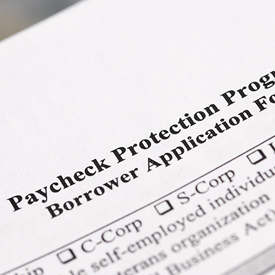CARES Act Update: Beneficial Changes Made to the Paycheck Protection Program (PPP) Through the Flexibility Act

The President signed the Paycheck Protection Program Flexibility Act ("the Act") into law on June 5, 2020. The Act provides several enhancements to the original program which was created under the Coronavirus Aid, Relief, and Economic Security Act (CARES Act).
The Act addresses many of the concerns expressed by the small business community around the Paycheck Protection Program. With more than 4.5 million businesses receiving PPP loans, the Act provides welcome relief, and more flexibility for loan forgiveness. Specifically, the Act provides enhancements in the following areas:
Covered Period Extended
Borrowers now have more time to spend the loan proceeds. Originally, spending had to occur within the "covered period" of eight weeks from the receipt of the proceeds. That placed a lot of pressure on businesses to apply all the funds to forgivable expenditures during a very short window of time. Now borrowers have the earlier of 24 weeks after the loan is disbursed or until December 31, 2020, to use the proceeds.
Use of Funds and Loan Forgiveness
The PPP Flexibility Act reduces the percentage of the loan that needs to go toward payroll costs in order to qualify for forgiveness. Now, 60% of loan proceeds must be spent on payroll costs, down from 75%. That means the forgivable non-payroll expenses can be as high as 40% of the loan, up from 25%. The list of what qualifies as forgivable expenses has not changed:
- Payroll Expenses
- Non-Payroll Expenses, defined as:
- Mortgage interest payments on real or personal property (debt incurred before February 15, 2020);
- Rent or lease payments for the business on real or personal property (lease in effect before February 15, 2020); and
- Utility payments for the business for electricity, gas, water, transportation, telephone, or internet access (service begun before February 15, 2020).
Deferral Period Extended
Previously, payments of principal and interest on existing PPP loans were deferred for a period of six months from the date of the loan. The Act extends the deferral period to the date the lender receives the forgiven amount from SBA. If a borrower does not apply for loan forgiveness within 10 months following the end of the covered period, the deferral period will end on the date that is 10 months after the last day of the covered period.
Deadline to Restore Reductions in Headcount and Compensation Extended
The calculations to determine whether the loan forgiveness amount must be reduced based on reductions in full-time equivalent (FTE) headcount and wages under the CARES Act and existing SBA guidance continue to apply. However, certain safe harbors have been modified or added by the PPP Flexibility Act.
Previously, the forgiveness amount would not be subject to reduction if a borrower restored its FTE headcount and wages by June 30, 2020. The Act extends this deadline to Dec. 31, 2020. This means that if a borrower restores its FTE headcount and wages to its Feb. 15, 2020, levels by the end of 2020, no reduction in forgiveness will apply.
The Act also adds a new safe harbor for FTE reductions to address a borrower's inability to rehire employees or resume pre-pandemic business activity. This new safe harbor provides that a reduction in the number of FTE employees will be disregarded if:
- The borrower can document an inability to rehire individuals who were employees on Feb. 15, 2020, and an inability to hire similarly qualified employees for unfilled positions on or before Dec. 31, 2020.
- The borrower can document an inability to return to the same level of business activity before February 15, 2020, due to COVID-related social distancing, sanitation, and other safety requirements or guidance from the Centers for Disease Control, Health and Human Services, or Occupational Safety and Health Administration issued between March 1, 2020, and December 31, 2020.
Payroll Tax Deferral
The PPP Flexibility Act lifts the ban on borrowers whose loans were partially or completely forgiven from deferring payment of payroll taxes. The payroll tax deferral is now open to all PPP borrowers. Previously, if a borrower received loan forgiveness, they could not continue to defer payroll taxes as allowed under the CARES Act. A borrower may now continue to defer 2020 payroll taxes, even after they receive loan forgiveness.
Repayment Period Extended
The Act gives borrowers whose loans are not forgiven more time to repay the loan. The repayment period has been extended from two years to five years. This provision of the Act only affects borrowers whose PPP loans are disbursed after its enactment. With respect to already issued PPP loans, the Act states specifically that nothing in the Act will "prohibit lenders and borrowers from mutually agreeing to modify the maturity terms of a covered loan." The low interest rate of 1% remains in place and was not changed.
Helpful Links
For complete details of the PPP Flexibility Act, a link to the Congressional Bill is provided below.
Key Website Links For Paycheck Protection Program Flexibility Act of 2020
THE CONGRESSIONAL BILL - H.R.7010 – Paycheck Protection Program Flexibility Act of 2020:
U.S. Small Business Administration – Paycheck Protection Program:
Guide to PPP Loan Forgiveness:
June 2020

